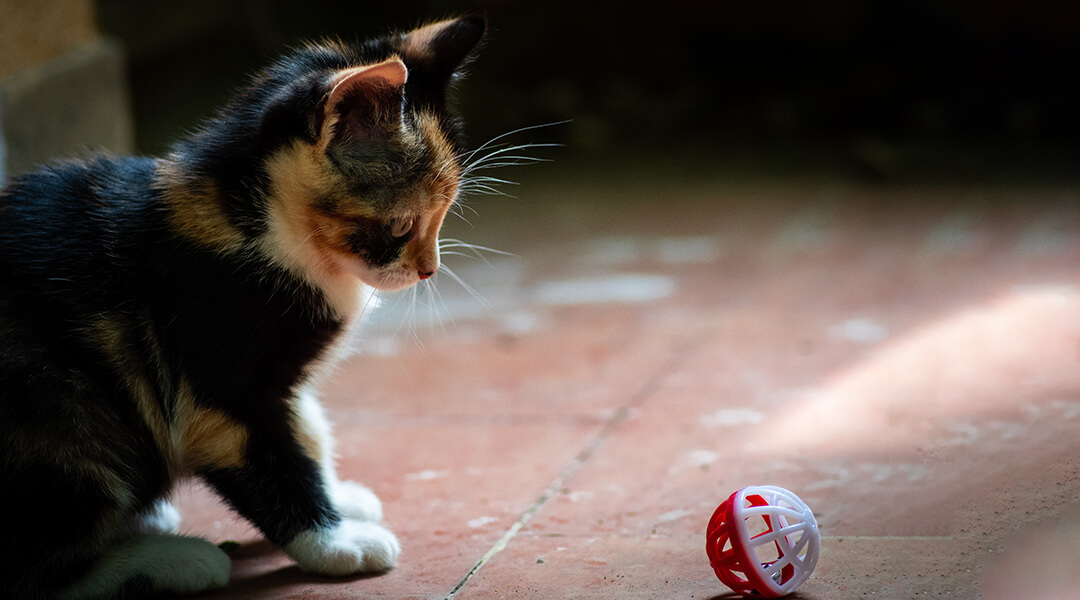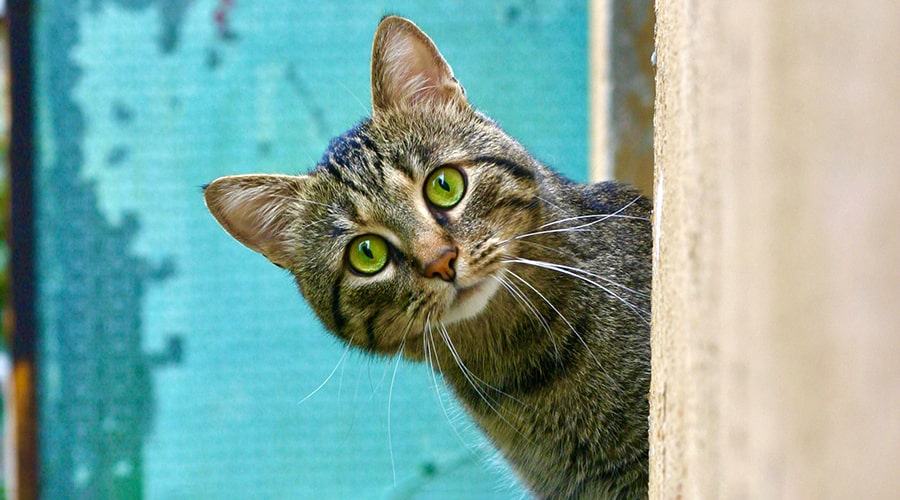Many cats love to play with each other and their humans. Carry on reading to find out about the benefits of play and more.
If you're a cat owner, you’ll know cats love to play! But why is play so essential for your furry friend? Turns out, there are a lot of reasons. It helps them stay physically and mentally healthy and playing with your cat is just plain fun! So make sure to set aside some time for some good old-fashioned playtime today. Your cat will thank you for it!
Carry on reading to discover more about the benefits of playing with your cat, as well as explanations about your cat’s odd playtime habits, such as why cats play fight and why cats play bite.
What are the benefits of play for cats?
Playtime isn’t simply about fun and games. It’s important for cats for a number of reasons, from staying active to preventing boredom. Read more about some of the top benefits of play below.
Playing with your cat helps you bond with them
Most cats love to play with their humans, so playing with your furry friend is great for strengthening the connection you share. It’s also a great opportunity for you to get to know their individual personality and preferences. By regularly playing with your cat, they’ll associate being with you with fun. You may even win the title of “favourite person”! Keep some treats, such as a [packet of DREAMIESTM] nearby, so you can reward them for playing nicely.
Playing is good exercise
Playing helps to keep your cat fit and healthy. By encouraging them to be active, it maintains a healthy body weight and keeps muscles toned and strong. This is especially important for indoor cats, who may not get as much opportunity to run around and explore as their outdoor pals.
Playing socialises your cat
Cats can’t engage in chat in the same way us humans can, so playing is the perfect way for them to interact with those around them. Playing with people and other pets helps our felines to socialise, form relationships and develop important skills such as communication and problem-solving. Encouraging them to play from a young age will also build their confidence, so they become more comfortable around people and other pets.
Playing keeps your cat stimulated
Play is amazing for keeping your furry friend happy and their brain alert. You can keep them entertained and stimulated by using a toy for them to stalk, chase and pounce on. This also helps them burn off any excess energy and relieve boredom or stress. Check out our article on [how to choose toys for your cat] for ideas about what your cat might love.
How long should you play with your cat? And how often?
There’s no set rule for how long to play with your cat, or how often, but ideally, you should aim for around 10-15 minutes each day. This can be broken up into a few shorter sessions if needed, as cats are naturally active in short bursts. Every cat is different though. Active cats would be happy to play all day, while sedentary characters often need some encouragement. Our article on [games to play with cats] can hopefully spark some inspiration about how to play with your furry friend.
Kittens have lots of energy and need to play more often than adult cats, so try and play with your kitty several times a day, for around 15-20 minutes at a time. This will give them the exercise they need and help with their social development.
How cats play with each other
If you have more than one cat, you've probably noticed them playing with each other at some point. Typically, cats play with other cats by stalking and chasing their friend, pouncing and leaping on them, or wrestling and batting around with their paws. Although this behaviour is natural for cats, it's important to always keep an eye on things in case they get carried away and the playing gets too rough. We don’t want anyone getting hurt!
Why do cats play fight?
Cats enjoy a rough and tumble approach when they play with other cats, and it can often leave you wondering whether the cats are play fighting or just straight up fighting! Lots of them (especially young ones) love to wrestle, chase and playfully attack other felines, as it’s how they express their predatory instincts. By play fighting, cats can also socialise and build relationships with other cats. They may even show this behaviour when playing with their pet parents, by attacking a foot or hand. Ouch!
Why do cats play bite?
Cats play biting is also quite common. Many like to nip during play because they are expressing their natural hunting instinct, but it’s not generally meant as a sign of aggression. It’s their way of saying “I’m just playing, but let’s take this up a notch!”.
If your cat is biting too hard, then this could be a sign of aggression. You can nip this habit in the bud by ending playtime when things start to escalate, and by praising and rewarding them for being gentle during play. You can read more about rewarding your cat in our article on [when and why to treat your cat].
How do cats and dogs play with each other?
When you think of the relationship between a cat and dog, the term “fighting like cats and dogs” likely comes to mind. But, when given the opportunity to get to know one another, they can actually be the best of friends (sometimes!).
When cats and dogs play with each other, it can easily be mistaken for aggression, so understanding body language is the key to knowing when to intervene. For example, you’ll often see cats and dogs take turns chasing, wrestling, and pinning each other down. Warning signs to look out for include one pet running away to hide, sounds of pain, aggressive growls from the dog (that differ from playful ones), and your cat hissing or growling. Cats like to play quietly, so any sounds are likely to be a red flag. Always make sure that they can get away easily if needed, for example to a high perch where they feel safe. It’s also important to make sure your cat can’t get cornered, as this could lead them to lash out with their claws if they feel threatened.
What if my cat doesn't want to play?
If your cat doesn’t want to play, don’t force them. Some cats are naturally more sociable and active than others, and sometimes they’re simply not in the mood. We all have those days, so try again another time or offer them an alternative activity such as grooming or petting. This said, sometimes not wanting to play could be a sign that your cat is experiencing discomfort, such as dental issues or arthritis. If you think this could be the case, get advice from your vet.
Playtime is important for cats for many reasons. It helps to keep them fit and healthy, and helps prevent boredom. Check out our irresistible [flavours of DREAMIESTM] to make playtime even more enjoyable.











